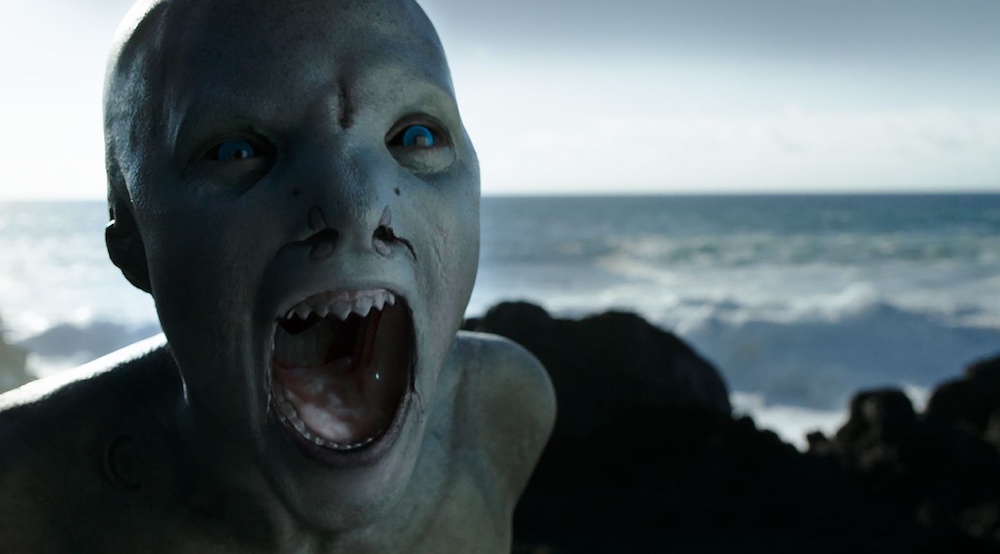Fantasia Film Review: ‘Cold Skin’
By Dennis Harvey
LOS ANGELES (Variety.com) – Xavier Gens’ period chiller “Cold Skin,” based on the 2002 novel by Catalan author Albert Sánchez Piñol, offers a good-looking and well-crafted if familiar chunk of creature-siege horror as two men in a remote setting battle off an army of amphibious attackers each night. Even the critters themselves have a déjà-vu quality — they resemble the pale-white, clammy humanoid predators of the “Descent” movies — though the primary setting of an island lighthouse over a century ago lends some distinctive atmosphere. Already released in several countries, Goldwyn’s planned Sept. 7 U.S. release should do all right with genre fans, though it won’t likely generate any clamor for sequels.
In Piñol’s widely translated book, the protagonist is a disillusioned fighter for Irish independence. Here, there’s no explanation why David Oakes’ young Irishman has decided to spend a year in complete isolation as the meteorologist on an island near the Antarctic Circle, though his air of angst does suggest flight from some trouble or other. He insists on staying despite entreaties from the kindly captain (John Benfield) whose ship has detoured to drop him here in a just-pre-WWI 1914, the notable absence of his predecessor, and the ominous signs of violent struggle in the cabin that now-missing man had inhabited.
The rocky atoll’s sole other inhabitant is Gruner (Ray Stevenson), an older man who at first appears mad, and is certainly unfriendly. Traipsing around in the nude, he barely seems interested in this rare intrusion by the civilized world, or in the new arrival he laconically dubs “Friend.” (We never do learn the real name of Oakes’ character.) He’s also inexplicably outfitted the lighthouse he’s caretaker of like a medieval fortress, with wooden spikes thrusting outward all the way to the top, as if to ward off invading hordes.
Seeking solitude, “Friend” shrugs off all these red flags and bids adieu to his travel-mates — no ship will pass here again until his term ends in 12 months. His questions are answered all too quickly: As soon as night falls, our hero’s abode is attacked by numerous semi-aquatic creatures. A similar assault clearly claimed his predecessor’s life, and he only survives this one by retreating to a cellar.
The next night, he fortifies his digs. But the ensuing skirmish leaves the cabin uninhabitable. “Friend” has no option but to move into the lighthouse, where Gruner makes him feel most unwelcome — in part because Gruner isn’t actually alone at all, but cohabits with a female creature (Aura Garrido) he’s “tamed” to treat as part slave, part mistress. Dubbing her “Aneris” (i.e. “siren”), “Friend” realizes her kind aren’t necessarily, inherently murderous, just as she learns some men are kinder than brutish Gruner. Nonetheless, the two émigrés must spend most nights in combat with the throng that rises from the sea at dusk. It is Gruner’s goal to eradicate these “toads” altogether, something that becomes possible once the duo access dynamite buried by a shipwreck nearby.
That this exterminating war may be unnecessary — that in fact the two species might be able to peaceably co-exist — is an eventual revelation that doesn’t make much sense in Jésus Olmo’s screenplay, rendering the fadeout of the film adaptation rather silly. Perhaps the novel had more narrative ambiguity and psychological nuance; here, “” becomes a fairly uncomplicated monster movie. No matter that it begins with a quotation from Nietzsche and offers a few other pretensions toward higher meaning (notably in “Friend’s” voiceover narration). These elements just feel like unnecessary gloss on an essentially simple, down-and-dirty fantasy action tale.
But if the core material doesn’t translate into anything inspired, Gens (“Frontier(s),” “Hitman”) and his collaborators nonetheless expend considerable care on its packaging. There’s a lush, slightly storybook quality to Daniel Aranyo’s very handsome widescreen lensing, abetted by artful design contributions including first-rate CGI. Though exteriors were shot on the Canary Islands, they manage to evoke an arctic extremity well enough. Victor Reyes’ original score is stirring in a conventional orchestral manner. The actors also invest their roles with conviction and craft, even if the story ultimately doesn’t quite reward such seriousness of approach.

